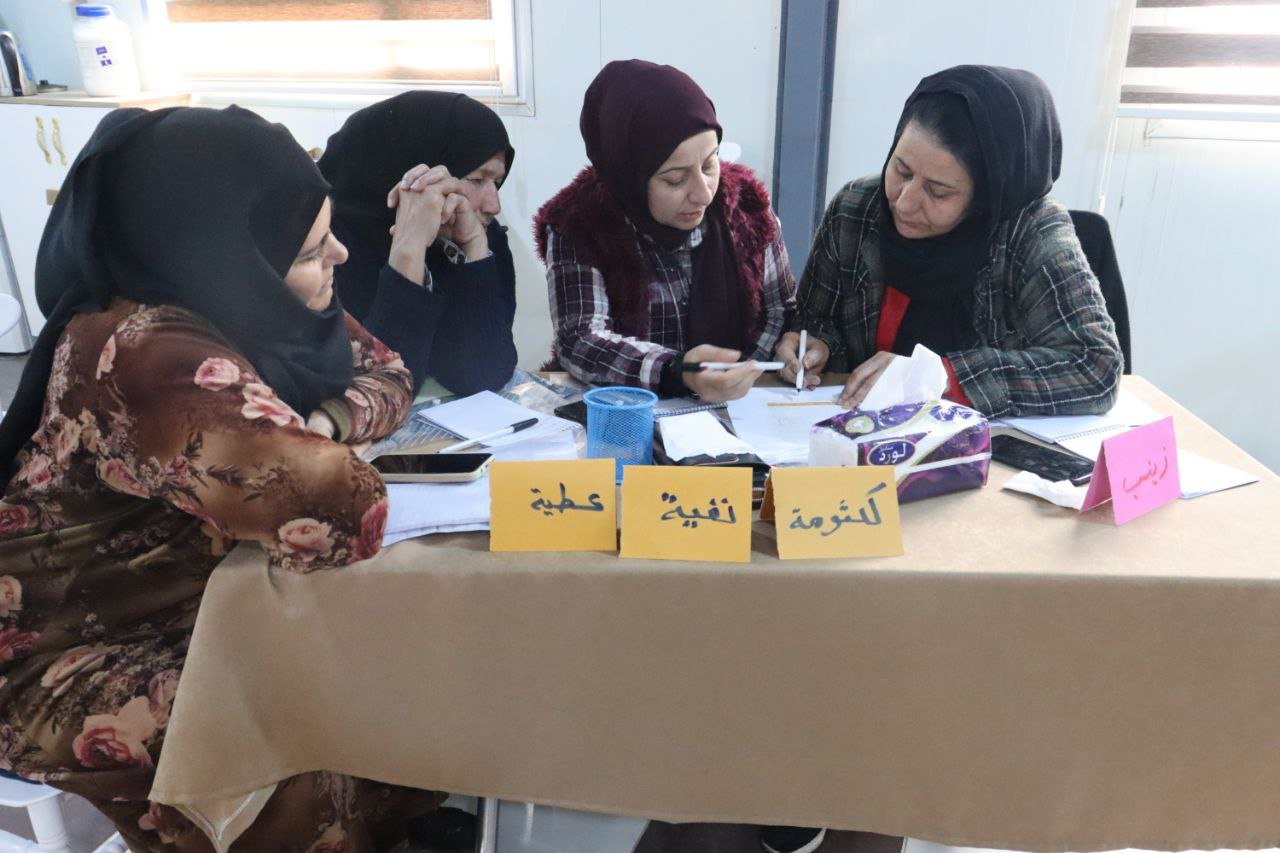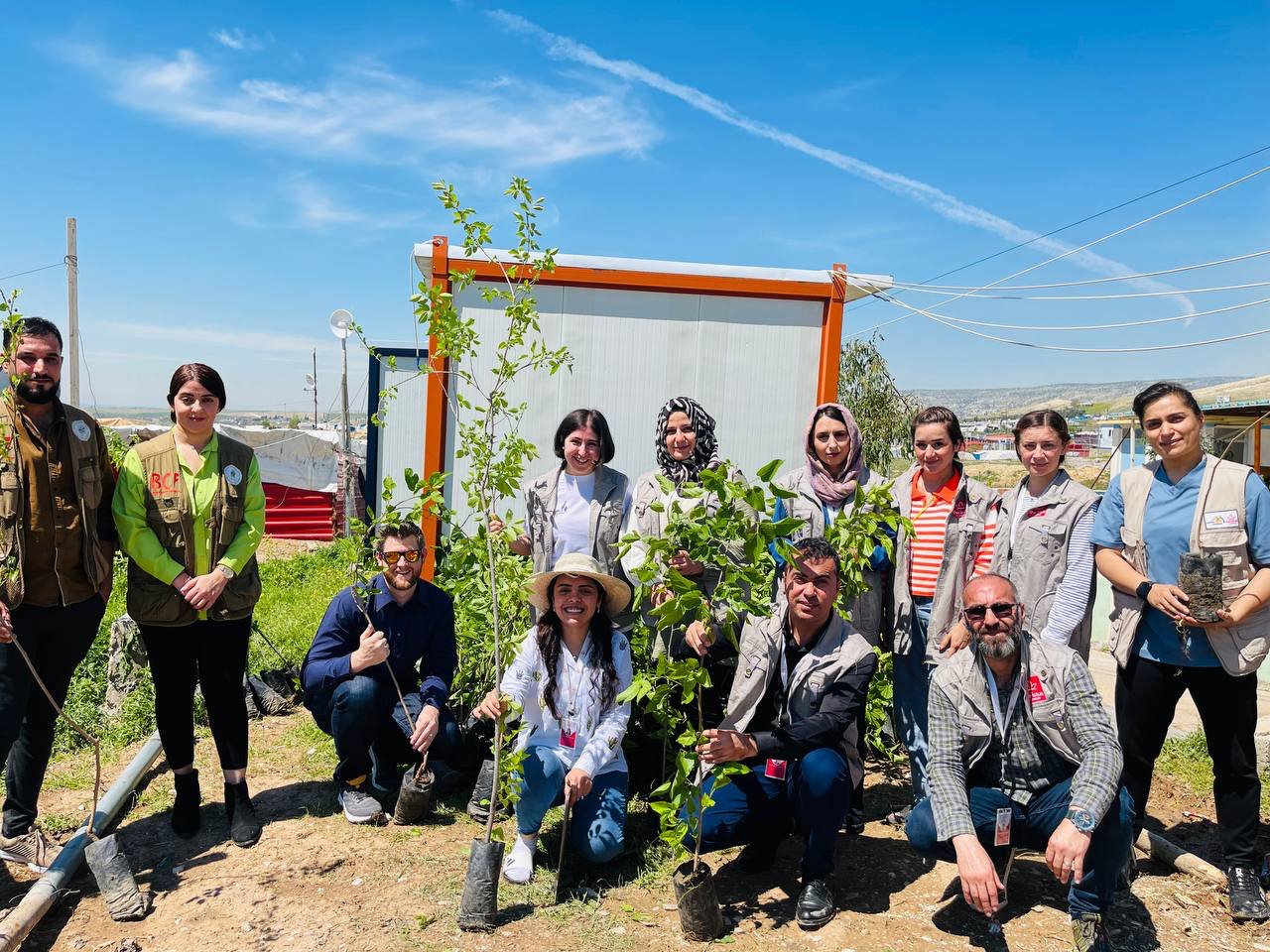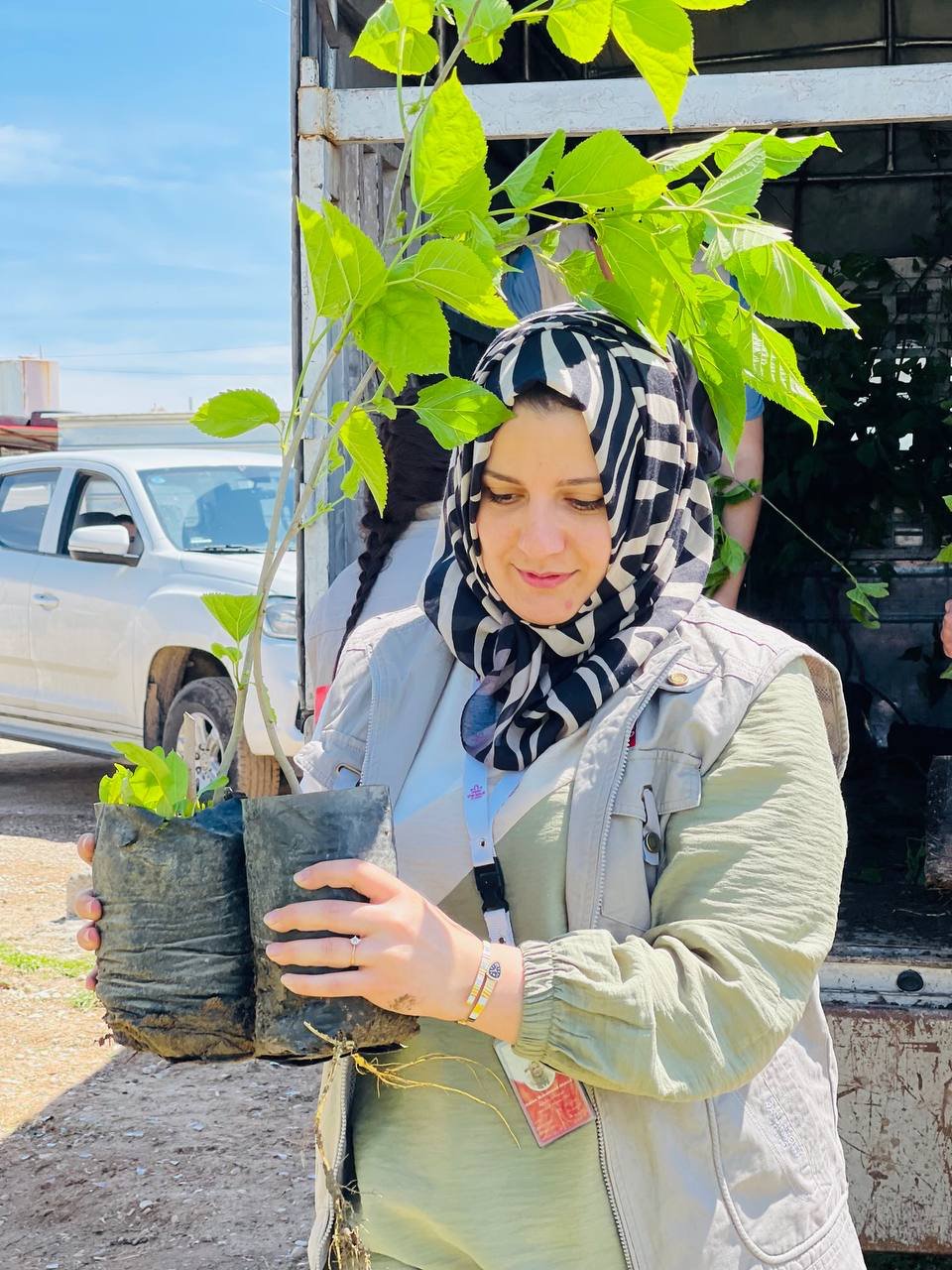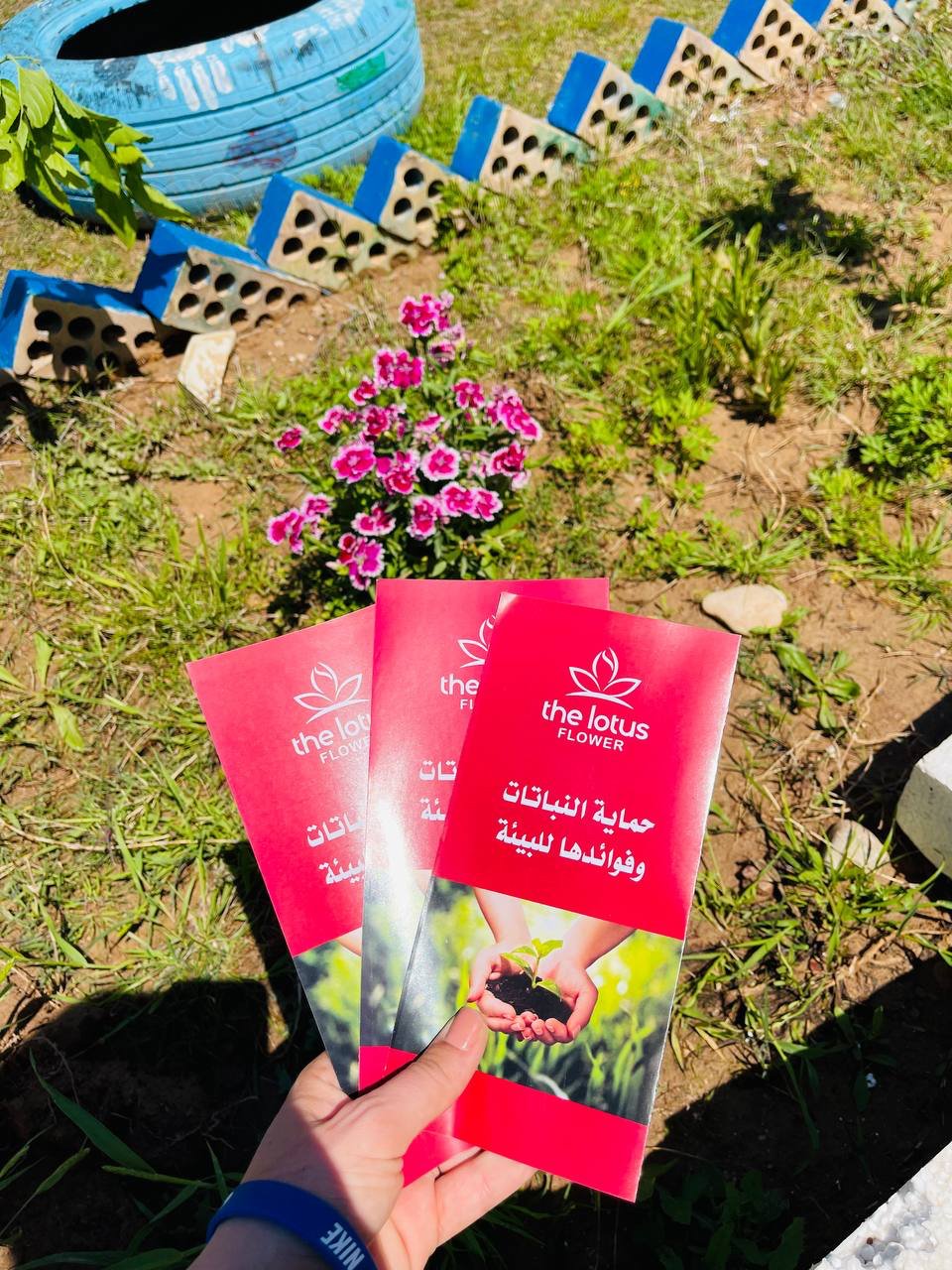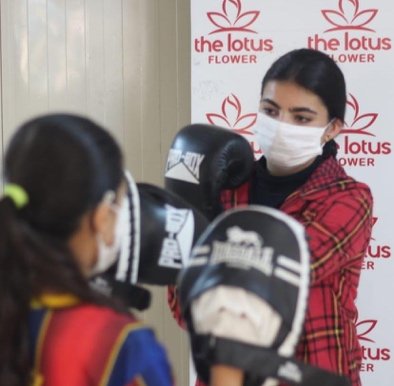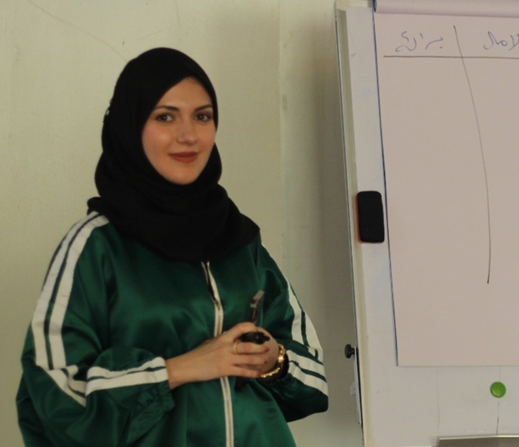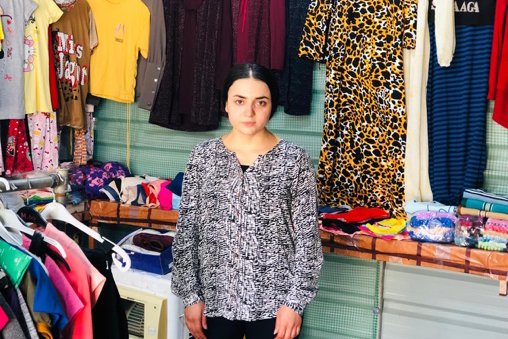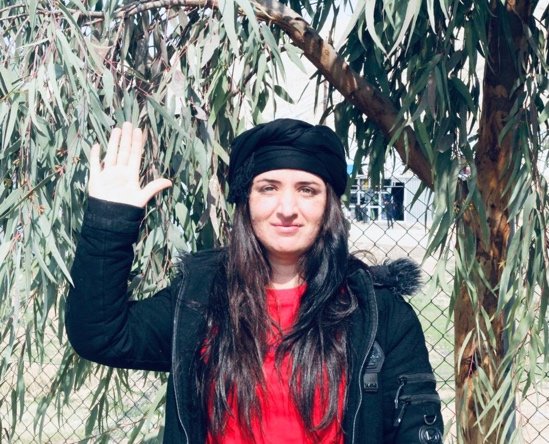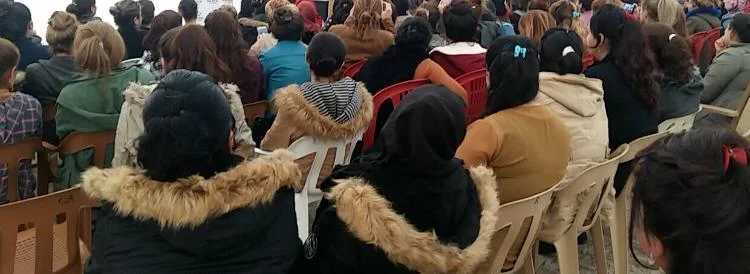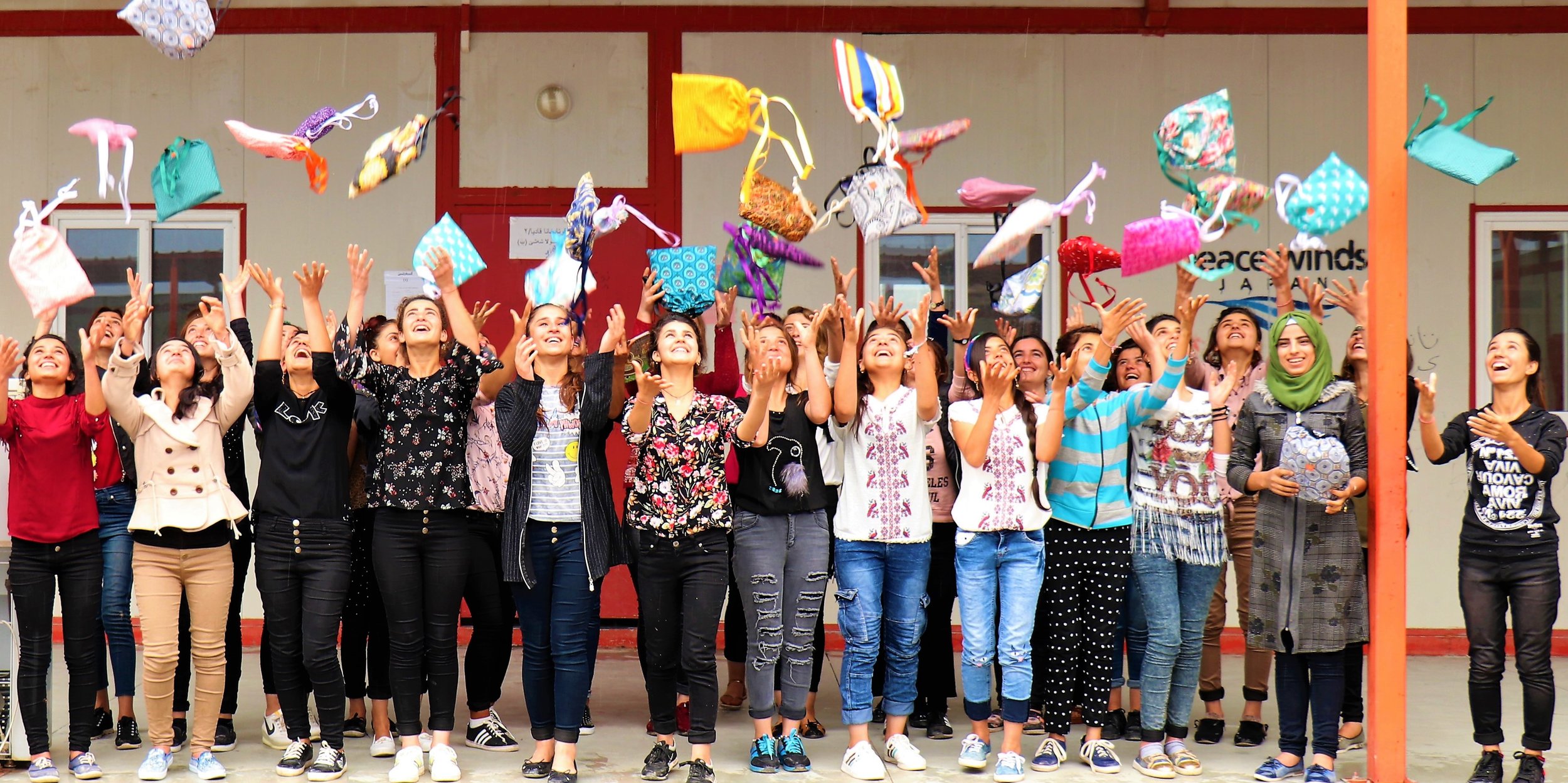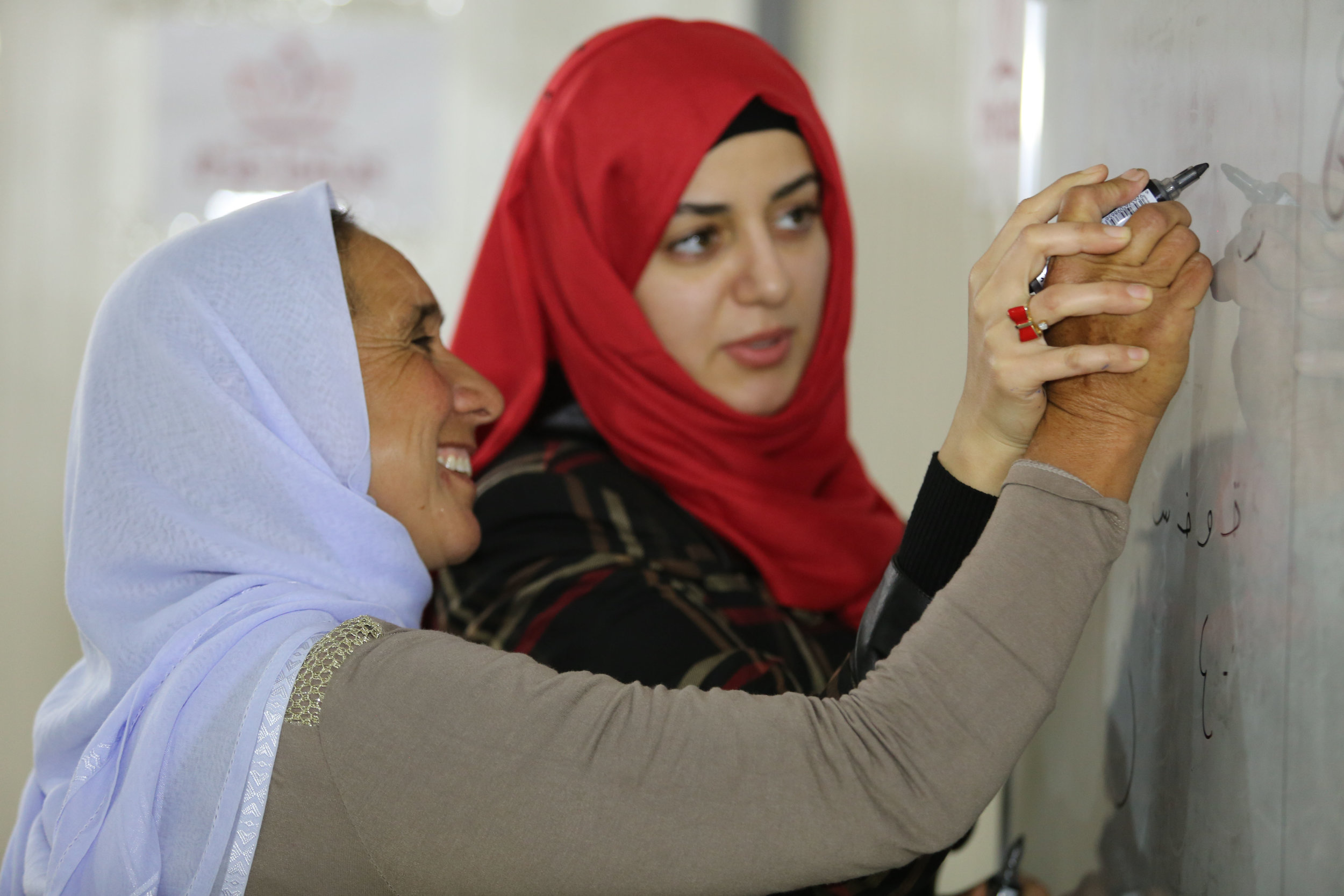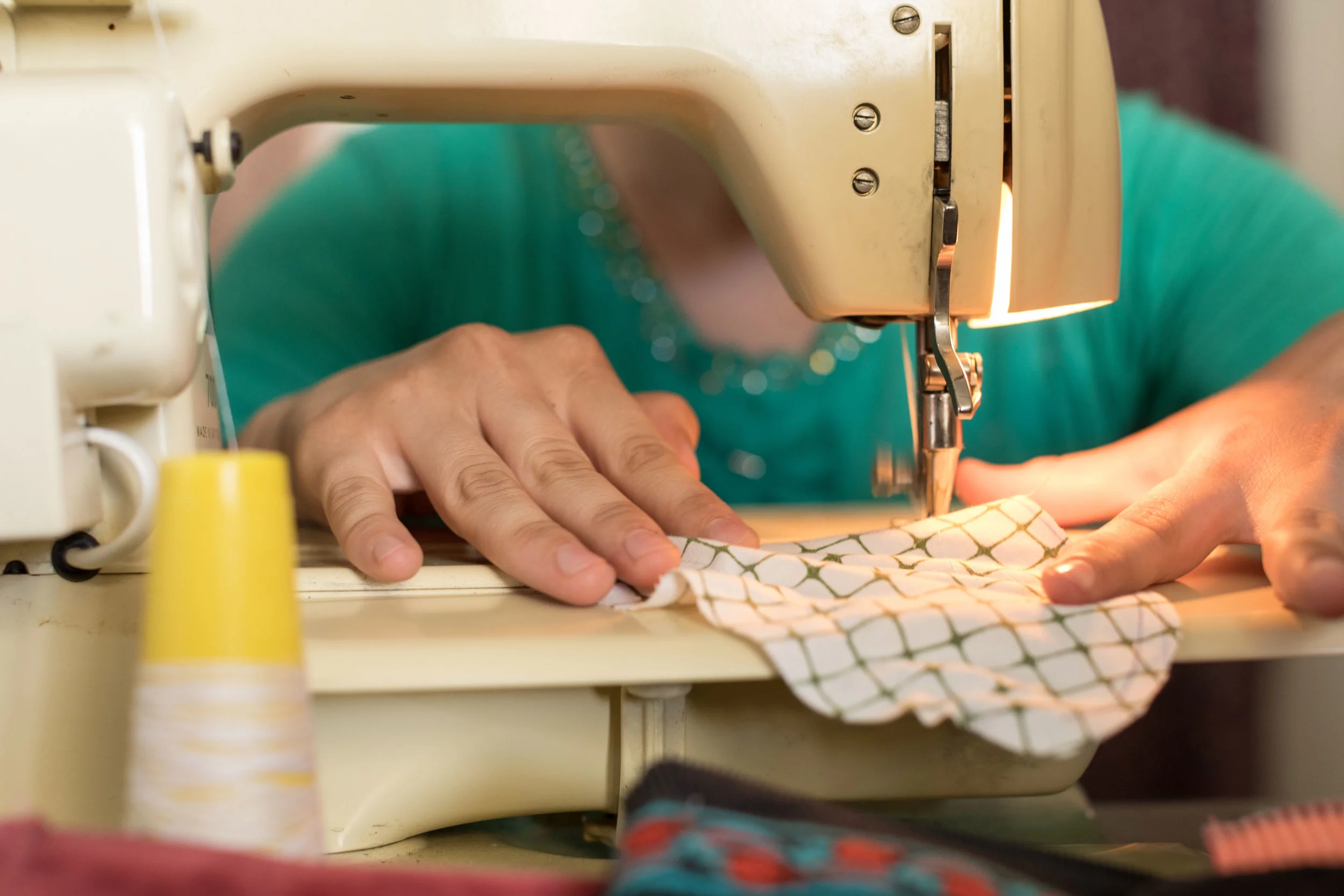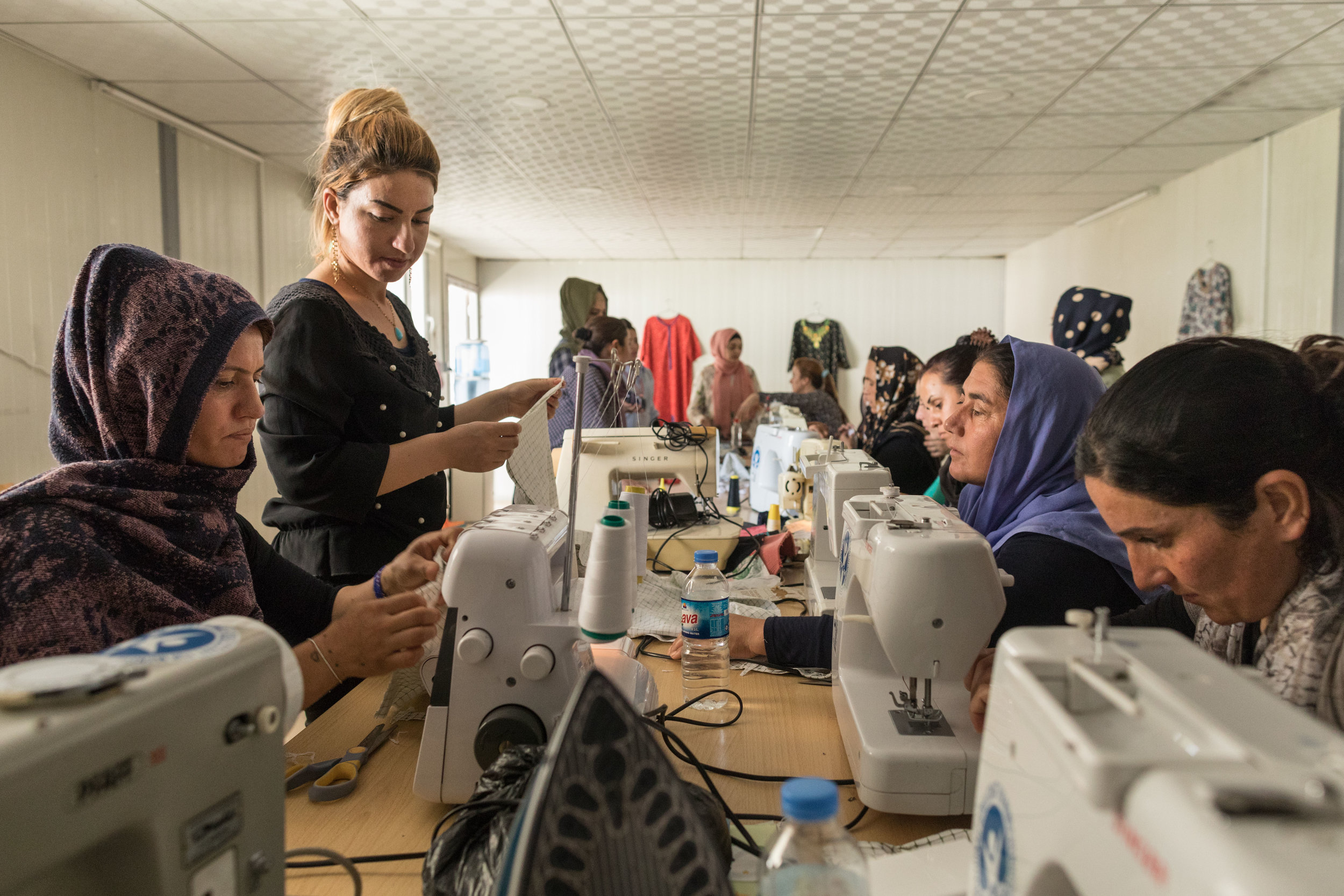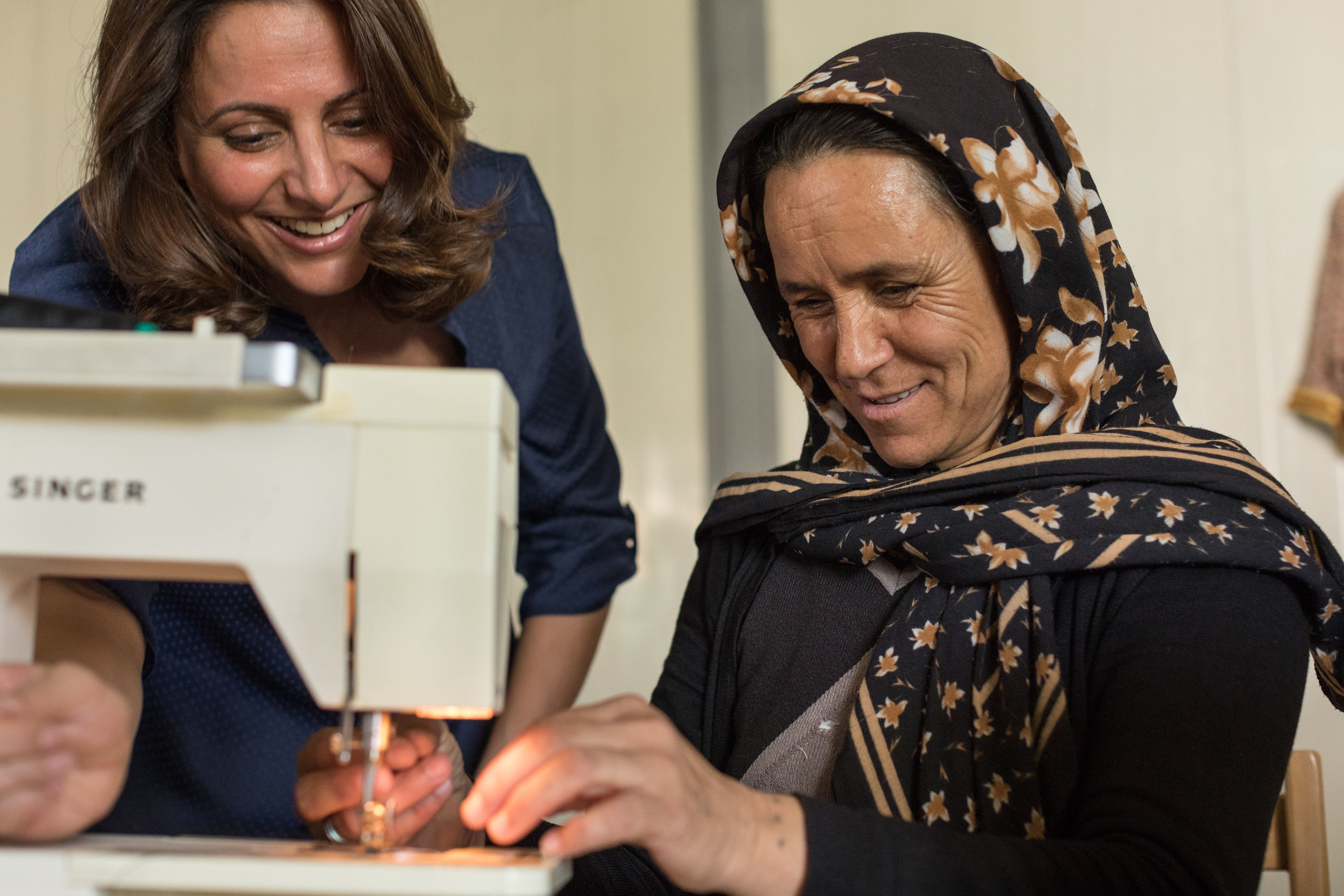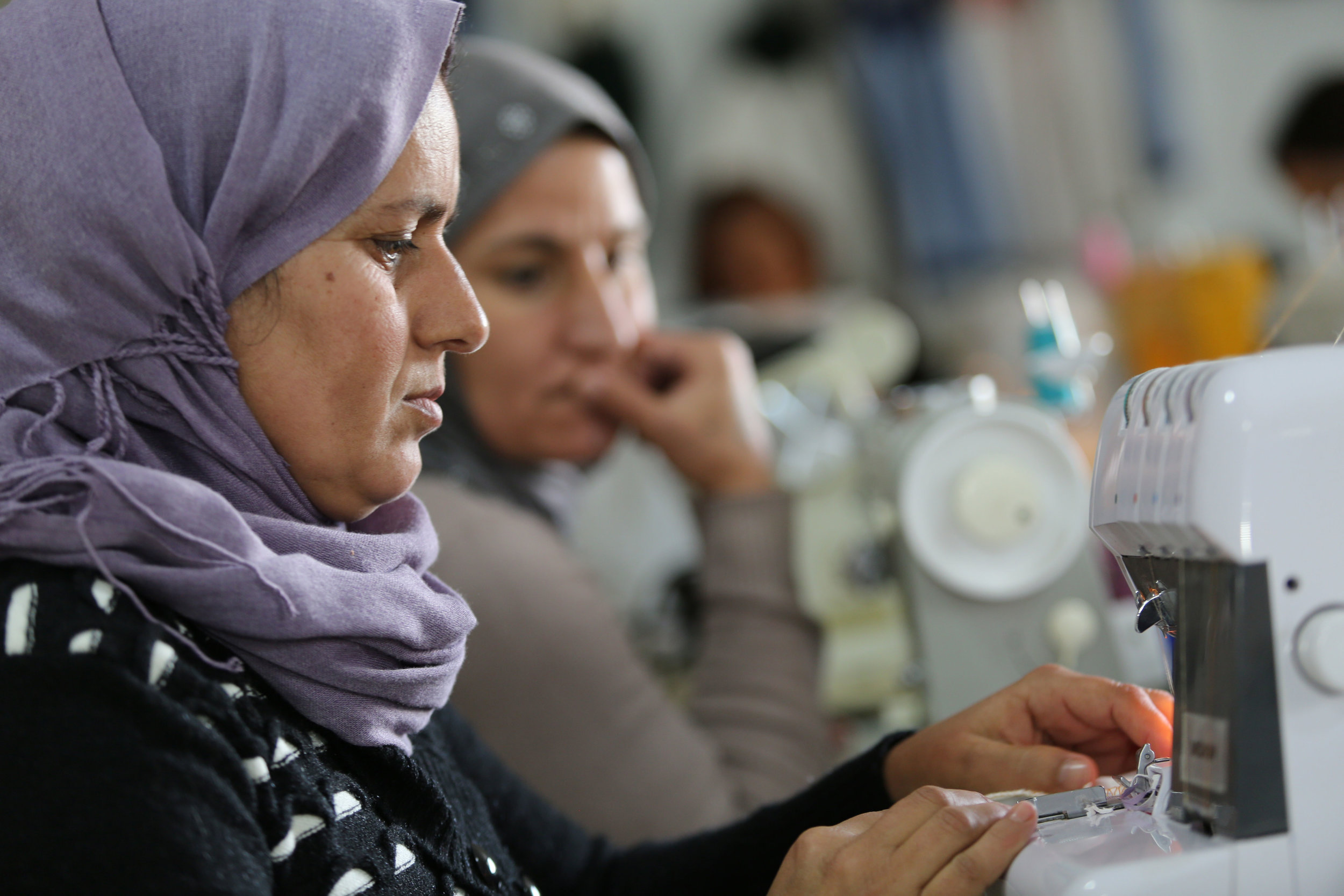Child protection
Our Child Protection project is in partnership with UNHCR sees us working to protect vulnerable children from violence, abuse, exploitation and discrimination, while providing them with access to necessary support services, and enhancing their social and emotional wellbeing.
Activities include games and sports, art, music and singing, as well as non-formal educational classes in English language.
Our Child Protection project is in partnership with UNHCR sees us working to protect vulnerable children from violence, abuse, exploitation and discrimination, while providing them with access to necessary support services, and enhancing their social and emotional wellbeing.
Activities include games and sports, art, music and singing, as well as non-formal educational classes in English language. We’re also providing much-needed psychosocial therapy aimed at improving their wellbeing and building cohesion, with priority given to those with specific mental health or protection concerns. Case management is also being provided for the most at-risk children, to ensure they receive access to services such as emergency cash assistance and medical support.
Other activities for children include awareness-raising and resilience sessions on topics like bullying and hygiene. Additionally, we’re supporting refugee parents and caregivers, providing sessions on how to deal with children and young people’s psychological needs.
As part of the project, the Lotus Flower has also been supporting and building the capacity of three community-based organisations – ROJ, Gashbun and Hevi – to provide activities for vulnerable refugee and asylum seeker children from Syrian and non-Syrian backgrounds.
Finally, the project includes capacity-building training on Child Protection measures for government staff and other community organisations and partners.
Earth Sisters
Supported by the German Federal Foreign Office in Erbil, Earth Sisters aims to upskill and increase the capacity of women and girls in Duhok on climate change and its links to gender-based violence.
The project is part of our core Climate Change pillar, which we launched earlier this year, and has seen 50 Earth Sisters trained in order to highlight gender injustices, women’s rights, and crucially, the vital role women and girls can play in climate change response.
Supported by the German Federal Foreign Office in Erbil, Earth Sisters aims to upskill and increase the capacity of women and girls in Duhok on climate change and its links to gender-based violence.
The project is part of our core Climate Change pillar, which we launched earlier this year, and has seen 50 Earth Sisters trained in order to highlight gender injustices, women’s rights, and crucially, the vital role women and girls can play in climate change response.
Following the training, they will lead a range of initiatives to raise community awareness about environmental issues affecting the region, which will be facilitated and supported by the Lotus Flower. They will also increase awareness of the ways in which climate change exacerbates GBV, while also identifying ways of reducing the risks.
Earth Sisters is especially important as Iraq has been ranked as the fifth most vulnerable country in the world to the effects of climate change. The country is facing impacts of large population growth, multiple wars and poor land planning, as well as higher temperatures and decreasing rainfall.
CASE STUDY
Mahabad is one of the first women to take part in the project, and she says: “Being chosen as one of the 50 Earth Sisters made me happy, and I was very excited to participate in the training sessions – to gain knowledge, meet new friends and stop the process of overthinking which I had been suffering from.”
The Lotus Flower School Garden
Our School Garden at Domiz 2 camp is a unique environmental stewardship scheme, designed to equip 80 children and young people with the skills they need to play a role in changing behaviours and attitudes towards climate change in their communities.
With a varied and diverse botanical zone, the garden has more than 1,200 plants, ranging from ornamental trees to flowers, cacti and fruit trees, and the youths are learning how to grow and nurture plants and vegetables themselves, while receiving educational classes about our precious environment.
Our School Garden at Domiz 2 camp is a unique environmental stewardship scheme, designed to equip 80 children and young people with the skills they need to play a role in changing behaviours and attitudes towards climate change in their communities.
With a varied and diverse botanical zone, the garden has more than 1,200 plants, ranging from ornamental trees to flowers, cacti and fruit trees, and the youths are learning how to grow and nurture plants and vegetables themselves, while receiving educational classes about our precious environment.
Image courtesy of CARE
The garden forms part of our She Leads in Food Security project and aims to deliver lasting change in the lives of children. Many young people in refugee and IDP camps have never seen seeds sprout or vegetables grow before, but through the school garden they can experience the rewards of fresh produce and understand natural growth cycles — from the initial seeding process to harvesting healthy, ready-to-eat food.
Our She Leads in Food Security project is being delivered in partnership with CARE Iraq, through funding from BMZ with implementation by the Deutsche Gesellschaft für Internationale Zusammenarbeit (GIZ).
She Leads in Food Security
As the very first project to sit under our Climate Change pillar, we launched ‘She Leads in Food Security’ in early 2023 to enhance the food security and economic status of IDPs, refugees and returnees in Sinjar district.
The project focuses on climate-smart agriculture and income-generating initiatives, as well as large-scale awareness around issues relating to nutrition, food wastage, food preservation and environmental issues.
As the very first project to sit under our Climate Change pillar, we launched ‘She Leads in Food Security’ in early 2023 to enhance the food security and economic status of IDPs, refugees and returnees in Sinjar district.
The project focuses on climate-smart agriculture and income-generating initiatives, as well as large-scale awareness around issues relating to nutrition, food wastage, food preservation and environmental issues.
To launch the project, we trained 10 female community Food Security Ambassadors, whose role is to raise women’s knowledge of food security. They subsequently trained 400 women and youths at our in-camp centres. This was followed by business training for 200 women and 50 men, using the Gender and Entrepreneurship Together (GET Ahead) program, which aims to remove the many barriers women face in starting businesses.
Food security is of increasing concern in Iraq and Kurdistan due to multiple socio and economic challenges – including the pandemic and associated job loss, plus the impact of the Ukraine conflict which has caused steep food price rises. Not only that, but lower than usual seasonal rainfall, rising temperatures and failing crops have all worsened the plight of the most vulnerable when it comes to food supply. In fact, the 2022 Humanitarian Needs Overview for Iraq stated that more than 82% of IDPs in camps are vulnerable to food insecurity.
The grave situation last year saw the Food and Agriculture Organization of the United Nations (FAO) and the United Nations World Food Programme (WFP) issue a joint statement which urged: "Food is the path towards peace and as such, serious action must be taken immediately by the Government of Iraq and the International community to adopt climate smart food systems and long-term resilience building in order to ensure that Iraq and its people are able to navigate these testing times.”
As well as serving as a response to this urgent call for action, we are keen for She Leads in Food Security and similar projects in future to harness the huge agricultural potential of Kurdistan – which is commonly known as the Middle East's food basket.
The project is being provided in partnership with CARE Iraq, and is funded by the German Federal Ministry of Economic Cooperation and Development (BMZ) and implemented by the Deutsche Gesellschaft für Internationale Zusammenarbeit (GIZ).
Jam Sisters
After launching on International Women’s Day in 2023, Jam Sisters is an initiative that is supporting a small group of female Syrian refugees so they can become financially independent by making jams from local fruits and ingredients.
As an extension of our existing ‘Sisters’ programming, Jam Sisters is a viable food income generation opportunity, while also improving awareness of climate adaptation.
After launching on International Women’s Day in 2023, Jam Sisters is an initiative that is supporting a small group of female Syrian refugees so they can become financially independent by making jams from local fruits and ingredients.
As an extension of our existing ‘Sisters’ programming, Jam Sisters is a viable food income generation opportunity, while also improving awareness of climate adaptation.
The project has seen us provide and equip a dedicated 'Jam Factory', where the participants are now making and selling jams from products such as figs, apples, cherries and apricots, and selling them to local markets and the community. The self-led initiative means they are given the tools required to manage the business themselves and retain all profits to support their families.
Prior to beginning production, the women received professional business management and skills training, providing them with the knowledge and understanding needed to run a successful business. The initial group of women are also receiving financial and logistic support for the first five months, while linkages with external markets are being created.
As well as providing this much-needed livelihoods opportunity, the project includes psychosocial support, and it is hoped that by enabling women to become financially independent, they will be less prone to suffering gender-based violence and discrimination.
This pilot project has been launched in partnership with The Big Heart Foundation, but we are already planning to extend it further.
Environmental Awareness and Tree Planting
Our teams have been busy providing awareness on the need to care for and protect our communities, and on Kurdistan Environment Day in April 2023, we planted around 500 fig and blueberry trees to benefit families in Essyan camp, as well as 40 Robinia and Cypress trees in public spaces.
Our teams have been busy providing awareness on the need to care for and protect our communities, and on Kurdistan Environment Day in April 2023, we planted around 500 fig and blueberry trees to benefit families in Essyan camp, as well as 40 Robinia and Cypress trees in public spaces.
We also distributed nearly 500 brochures about environmental issues, containing information on harvesting wild edible plants which grow in spring. We’ve also conducted environmental awareness campaigns in Domiz 2 and Rwanga camp as part of the initiative.
These kinds of campaigns and activities will be increasing under our new Climate Change pillar - and we welcome any support in expanding this essential area of our work.
Boxing Sisters
Our Boxing Sisters project was originally set up with the help of Cathy Brown, a retired professional British boxer and certified Cognitive Behaviour Therapist. Inspired by Cathy, the boxing and self-defence taught by our trainers teaches girls about strategy and focus, relieves stress and increases their confidence as well as physical strength. By learning self-defence techniques, women and girls feel more secure knowing that they can protect themselves.
Our Boxing Sisters project was originally set up with the help of Cathy Brown, a retired professional British boxer and certified Cognitive Behaviour Therapist. Inspired by Cathy, the boxing and self-defence taught by our trainers teaches girls about strategy and focus, relieves stress and increases their confidence as well as physical strength. By learning self-defence techniques, women and girls feel more secure knowing that they can protect themselves.
The classes also help with anger management, as the physical activity allows pent-up feelings and trauma to move through the body and be released from the muscles. Finally, the project builds friendships and a community, because the Sisters always have a coach and a sparring partner.
Since the first iteration of Boxing Sisters, the programme has grown hugely, and is now one of our most popular and in-demand projects.
Cathy Brown, co-founder of Boxology Academy
CASE STUDY
As one of our younger beneficiaries, Rushna has found our regular girls’ boxing classes to be hugely beneficial – for both her mental and physical wellbeing. “I really enjoy boxing because it makes me feel strong,” she says. “I hope one day to be a boxing trainer myself, so I can teach other women and girls to defend themselves. It’s not all about physical strength, but it also gives you a strong sense of self-confidence and self-determination to face the difficulties in our lives. I want to share that with other young girls.”
Rushna also finds great comfort in visiting our women’s centre, adding: “It gives me opportunities to learn new skills and meet new friends, so we can spend time together instead of being stuck in our accommodation.”
Peace Sisters
As one of our newest projects, Peace Sisters provides women and girls with training so that they can lead peace processes and take a more active role in rebuilding their fractured communities. Although there are other projects on the ground that foster peacebuilding and social cohesion, we believe Peace Sisters is one of the first to train women to become mediators, peace defenders and active community leaders.
As one of our newest projects, Peace Sisters provides women and girls with training so that they can lead peace processes and take a more active role in rebuilding their fractured communities. First launched in partnership with the German Consulate, the project sees participants learn new skills in critical thinking, teamwork, communications and public speaking, with the aim of empowering them to recognise their human rights and take on prominent leadership roles.
Although there are other projects on the ground that foster peacebuilding and social cohesion, we believe Peace Sisters is one of the first to train women to become mediators, peace defenders and active community leaders.
Crucially, after the training, the women and girls implement community activities of their own choosing – which involve men and boys and encourage inclusion, collaboration and open dialogue across multiple faiths, cultures and generations. These activities have to date included awareness sessions around Women, Peace and Security, journalism workshops and self-defence classes.
Peace Sisters also falls directly in line with UN Resolution 1325, which calls for “an increase in the participation of women at decision-making levels in conflict resolution and peace processes.”
CASE STUDY
Laylan participated in Peace Sisters because she wanted to know more about mediation in conflict resolution. She says: “I enjoyed this experience, especially meeting new girls and learning about their experiences and opinions. My favourite thing about the training was that the mediation was taught by women and girls.”
She adds: “The training taught me to be in control of my feelings, be more confident, and be more goal-oriented in life. I hope this project grows and reaches more women and girls in the community as it is highly useful in different aspects of life.”
Women’s Business Incubator
The Lotus Flower Women’s Business Incubator (WBI) provides a financial foundation and business mentorship for women-led small businesses. In addition, our women’s centre will host educational sessions on gender-based violence and women’s legal rights.
Our award-winning Women’s Business Incubator (WBI) provides financial foundations and support for women to start their own small businesses. By providing financial grants, business training, mentorship and awareness sessions, the Women’s Business Incubator enables women to earn an income through their own skills, become financially independent, and create a sustainable business for themselves. Any profits the women earn through their endeavours is paid directly to them and under their full control to support their families and re-invest in their own business.
The training covers topics such as entrepreneurship, profit, revenue, payroll, supply chains, surveys and marketing, sales and accounting, plus scalability and risk. Successful businesses which have launched since the project’s launch in 2019 include hair and beauty salons, snack shops, restaurants, stationery stores and clothing and accessory shops. The project has also provided support for women’s businesses that were adversely affected by the pandemic, including training in digital skills and hygiene training, as well as online marketing and delivery services.
In addition, our Women’s Business Incubator provides psychological therapy for participants who are still suffering the aftermath of conflict, and also includes awareness sessions on gender-based violence and women’s legal rights. Male family and other community members also participate in these sessions, as by including everyone, men and boys do not feel marginalised and can choose to take an active supportive role. In recognition of the strengths of the project, we won a UNHCR Iraq award for Innovation in early 2022.
With many of the women we support have their own ideas about what sort of business they would like to run, most lack the capital and support to start them. Our Incubator provides these necessary inputs while also providing the community support that is a vital ingredient to business success.
CASE STUDY
Orphan Hussna came to Essyan camp with her grandparents in 2015. After taking part in several of our other projects – such as sports, crafts and photography – Hussna had the opportunity to take part in our Women’s Business Incubator project. After receiving intensive business training, a start-up grant and mentorship, she was able to open her own shop which now sells clothes for children and women in the community. It has proved a big success, and she says: “It means I now earn income for me and my family, so I can provide food and clothing for my grandparents. One day I hope I can pursue an education too, so that I become more skilled and am able to expand my business further and employ other people.”
Baking Sisters
What started as a small project, utilising the talents of a few skilled bakers amongst the women is going to develop into a longer term cafe project, to build a more extensive community space that will help foster relationships, confidence and community spirit.
With a shortage of public spaces for displaced women and girls to gather, as well as a lack of employment opportunities, it can be incredibly difficult for them to rebuild their lives. Our Baking Sisters initiative increases women’s capacity-building, skills development, financial independence as well as their self-confidence.
The project is managed and operated by the women themselves – with the initial equipment, structures, capital goods and raw ingredients provided by the Lotus Flower. As well as retaining any profits as an income and furthering their cooking skills, the project enables the women to gain vital business knowledge which they can use to develop their future careers.
Vitally, this extensive community space helps foster relationships, confidence and community spirit. The project is also supported by leading British chef and restaurateur Asma Khan, who helped us launch the project at Essyan camp – as you can see in this video.
Photo Credit: Asma Khan, @asmakhanlondon
CASE STUDY
Suad is a Syrian refugee and a survivor of domestic violence. As a single mother she struggled to provide for her four children, which affected her mental health. After receiving psychological support from the Lotus Flower, she was also selected to take part in Baking Sisters, and says: “Now I help run the Lotus Flower Bakery, so I can provide for my children. Spending time with other women and girls has been very beneficial. I am much stronger now, and feel happier as I can support my kids.”
Mental Health and Psychosocial Support
We offer a variety of programming to support mental health including awareness sessions, group discussions, art therapy (painting and knitting), community outreach and home visits. Topics include SGBV prevention, domestic violence, emotional abuse, prevention of early marriage, women’s rights.
Refugees and displaced people suffer from depression, anxiety and symptoms of post-traumatic stress disorder at rates of at least three times higher than the wider population. Younger females also experience severe psychological trauma after fleeing their homes and many struggle with the pervading sense of uncertainty and distress. Attempted suicide is increasingly common – especially as a result of the pandemic, when lost incomes and enforced isolation caused mental health disorders to rise dramatically.
We provide individual and group mental health support with trained psychologists, who are equipped to provide suitable treatment plans for each individual. Each case is treated with the utmost respect and sensitivity – which is essential given that many women and girls have experienced gender-based violence or sexual exploitation or abuse in a family setting.
Our centres incorporate individual and peer-to-peer support in all programming, and our safe social spaces encourage women and girls to support each other. Cultural and social sensitivities are also carefully considered. We also provide wellbeing programmes including yoga, mindfulness, group exercise, and related awareness sessions.
CASE STUDY
Nazdar was just 15 when her village was invaded by ISIS. Like so many others, she and her family were forced to flee their home, and Nazdar suffered with prolonged menstrual bleeding as a result of anxiety and fear. Once in camp, she and her family of eight had no choice but to live in a very small tent, which was partly exposed to the open air. “It was very harsh,” says Nazdar. “My father was chronically ill and paralysed, and I suffered with terrible migraines caused by stress. I didn’t know what to do.”
Nazdar was put in touch with a Lotus Flower psychologist and began receiving counselling. She began to understand her anxiety, what triggered these feelings and crucially, how best to deal with them. By working out a therapy plan that suited her, Nazdar has gradually built up her recovery and coping mechanisms, and she says: “I feel so much better these days, and that has enabled me to take part in other Lotus Flower activities too. I have been doing boxing, photography and craft courses, which keep me busy and take my mind off other things. It also means I have developed new skills and have been able to meet and bond with other women.
“As well as feeling better, I’m now able to support my father and family, which means I can finally feel more positive about our future.”
Human Rights
In any conflict, women and girls are known to suffer most, and displacement worsens pre-existing patterns of discrimination. This exposes them to heightened risks of human rights violations, including rape, slavery, trafficking, forced marriage and sexual violence, which all increase as a result of conflict, as well as torture and even murder. In addition, girls living in conflict-afflicted countries have less opportunity to go to school or seek employment.
In any conflict, women and girls are known to suffer most, and displacement worsens pre-existing patterns of discrimination. This exposes them to heightened risks of human rights violations, including rape, slavery, trafficking, forced marriage and sexual violence, which all increase as a result of conflict, as well as torture and even murder. In addition, girls living in conflict-afflicted countries have less opportunity to go to school or seek employment.
We run regular awareness sessions on topics focused around human, legal and women’s rights, as well as those related to employment and educational opportunities. These sessions are very popular and women and girls feel safe to engage in settings where conversation and dialogue across divides is encouraged. We have also launched programming to mitigate early childhood marriage, sexual and gender-based violence, and domestic violence. Additionally, all of our projects are underpinned by the principles of gender equality.
While we fundamentally believe in empowering women and girls so that they understand and demand their right, we also involve men and boys in our awareness sessions, as we believe they must play a part in achieving a fairer, more just society.
CASE STUDY
Haifa came to live in Essyan camp after the ISIS attacks, which left her homeless and facing a life of poverty. But with the support of our team, Haifa has been able to learn English and participate in awareness sessions on human and women’s rights. She says: “I choose to challenge injustice through learning and improving myself. Thanks to the Lotus Flower I can continue to learn these new skills so that I will be able to create a better future for myself.”
Storytelling Sisters
First launched as a pilot in Spring 2019, the Lotus Flower’s Storytelling Sisters project provides an educational platform for local women to learn a combination of photography and creative writing skills, enabling them to share their experiences through photos and stories. The project aims to provide marketable skills and facilitate improved mental health outcomes through shared experiences and community support.
First launched as a pilot in Spring 2019, the Lotus Flower’s Storytelling Sisters project provides an educational platform for local women to learn a combination of photography and creative writing skills, enabling them to share their experiences through photos and stories. The project aims to provide marketable skills and facilitate improved mental health outcomes through shared experiences and community support. The first project culminated in an exhibition in Duhok City, which validated the work of the participants and was very well-received by the local community and donors who attended.
As part of the programme, women and girls learn how to use DLSR cameras and photo editing software, plus how to create compelling video content and use social media platforms to share their work. The scheme serves as a creative outlet which helps women and girls heal from trauma, after many experienced unthinkable suffering at the hands of ISIS.
CASE STUDY
Ghazal, who moved into Essyan camp following the ISIS atrocities, took part in Storytelling Sisters after she had begun taking photographs to tell the stories of those living within the camp. “When I saw I was capable of doing this work, I created a page to show my pictures,” she says.
After completing the project, Ghazal started working with the Lotus Flower as a photography trainer for Storytelling Sisters, encouraging women to record their experiences visually as a healing and inspiring artform. “It is a joy to share my hobby with other women and girls, and also to be an official employee of the Lotus Flower.”
Men and Boys’ Trauma Project
We worked with Khaima to implement a pioneering project aimed at supporting men and boy Syrian refugees who have been badly impacted by conflict and displacement. The programme was designed to foster healing through the sharing of past ordeals and mental health therapy, as well as providing educational and holistic activities to encourage self-expression and the processing of feelings through art, music and poetry.
Prior to our project, Domiz 2 camp had no mental health support, therapy or educational activities specifically for men and boys. According to local authority and community representatives who participated in consultation meetings we held, psychological disorders, suicidal tendencies and gender-based violence had all been rising sharply.
In response to this, we worked with Khaima to implement a pioneering project aimed at supporting men and boy Syrian refugees who have been badly impacted by conflict and displacement. The programme was designed to foster healing through the sharing of past ordeals and mental health therapy, as well as providing educational and holistic activities to encourage self-expression and the processing of feelings through art, music and poetry.
Many of the male beneficiaries saw the atrocities of war with their own eyes, and were beaten or threatened themselves. Others saw women being subjected to violence and abuse, and even innocent men being beheaded. Although they locked away their trauma for many years, intense feelings of anger and fear inevitably built up, which they had no way of articulating or managing. Feelings of shame and social stigma had also prevented them from opening up about their experiences, especially in relation to struggles with mental health.
For the initial project, 25 men and boys were selected to take part, and the feedback and results were so encouraging that we again collaborated with Khaima to deliver a second round of the project in early 2022.
CASE STUDY
Aziz* is a Syrian refugee and married father of two young children, who has lived at Domiz 2 camp for eight years. He says: “I was glad to participate in the Men and Boys' Trauma project and really liked the awareness sessions. I was pleased to improve my English too. The psychological sessions and therapy were impactful and unique for us as men. I had never participated in such programmes before and I believe 90% of other men and boys hadn’t either. This project has helped me improve my skills, rebuild my life and become a better father to my kids, and a better husband to my wife.”
* Aziz’s name has been changed to protect his identity.
Supporting Survivors
Since 2016 we have been working with a team of pro-bono international lawyers at Hogan Lovells to pursue civil litigation cases for women ISIS survivors. The move is aimed at finally bringing Islamic State fighters to justice, while delivering compensation to female Yazidi survivors in northern Iraq.
Since 2016 we have been working with a team of pro-bono international lawyers at Hogan Lovells to pursue civil litigation cases for women ISIS survivors. The move is aimed at finally bringing Islamic State fighters to justice, while delivering compensation to female Yazidi survivors in northern Iraq. Rather than the duty falling on the tax-payer, we believe one solution is for states and governments to confiscate seized or sanctioned assets from foreign ISIS fighters, and redistribute these among the victims. The action is focusing on ‘homegrown’ ISIS fighters – identified by the women victims – from western countries including Australia.
Not only is reparation and redress the most appropriate outcome for identified foreign ISIS fighters, but we believe it will open new doors for the survivors – many of whom feel they have been abandoned by the western world. Holding their aggressors to account in this way will bring them a vital sense of closure at long last.
The civil action is to focus on ‘home-grown’ ISIS perpetrators from western countries who have committed atrocities such as rape, enslavement, torture and human trafficking. We are hoping this will pave way for new policy and legislation for all victims of sexual abuse in conflict.
Girls’ Hygiene
The Lotus Flower collaborates with partners including Operation Hope Australia, the Presbyterian Church and Days for Girls, in order to provide and promote sustainable solutions for female menstrual health. We implement menstrual health for girls aged between 12-16, who are currently living in the internally-displaced camps within Kurdistan.
The Lotus Flower collaborates with partners including Operation Hope Australia, the Presbyterian Church and Days for Girls, in order to provide and promote sustainable solutions for female menstrual health. We implement menstrual health for girls aged between 12-16, who are currently living in the internally-displaced camps within Kurdistan.
As well as the educational sessions, we distribute Days for Girls’ discreet menstrual kits to all attendees, and aim to mitigate social stigma so that girls are empowered to continue their education and achieve more opportunity. This is especially important, as a 2015 UNICEF/WHO assessment reported that at least 500 million girls and women lack adequate facilities for managing their periods – with many missing school as a result.
Menstrual health affects women and girls in all corners of the globe and has long-term impacts on education, economics, public health and societal norms. However, ingrained taboos, inadequate facilities, poverty and limited health education continue to mitigate what resources are available. It is even harder for women and girls who live in IDP or refugee camps when they do not have the resources they need on a monthly basis.
CASE STUDY
Elissa is a 12-year-old who lives at Essyan camp, and after participating in our menstrual workshops and receiving her kit, she says: “This is the first time I’ve received this kind of education, and I’ve learnt a lot about my body and its development. The kit is beautiful and easy to use. I love it.”
Adult Literacy
As the rise of ISIS forced many people to flee their homes, internally-displaced people fled to camps in northern Iraq. The majority of IDPs are from small villages and most of the female population were unable to attend school due to traditional, conservative policies or a lack of financial resources. As many of the women now find themselves solely responsible for their family, the lack of education has potential disastrous consequences for their future.
As the rise of ISIS forced people to flee their homes, tens of thousands of internally-displaced people sought refuge in camps in northern Iraq. The majority of refugees and IDPs came from small villages, where most of the female population were unable to attend school due to traditional, conservative policies, a lack of financial resources, plus a history of conflict. With many of the women now solely responsible for their families, a lack of education has potentially disastrous consequences for their futures.
When the Lotus Flower arrived at Rwanga Community camp, our team spoke with many female IDPs who had to stay at home with their families but had a desire for education. In order to meet this, we created a women’s adult literacy course to teach students how to read and write in Arabic and Kurdish. The courses target beginner and intermediate-level students and we provide all materials, including stationery and textbooks. Since then, we have expanded our adult literacy courses to operate in each of our centres, serving a diverse community of refugee and IDP women.
The main objective of the literacy course is to provide a safe and supportive environment for women who were unable to attend school earlier in their lives to learn how to read and write. By the end of the course, they are able to comprehend the alphabet, numbers, and write simple sentences.
Basic literacy not only opens the door to further educational opportunities, but also acts as a platform to raise awareness on women’s rights and health education, while providing necessary skills for future employment. Course graduates have the opportunity to engage more confidently with the community and participate in new ways. Since launching in January 2017, the literacy course has become one of the most popular programmes at the Lotus Flower centres, with new requests to attend every day.
CASE STUDY
Monifa is one woman we support who suffered from depression and other psychological disorders after her marriage ended in 2015. She had never had the chance of an education before, so when she had the chance to take part in our adult literacy course, she decided to give it a go. “I’m so happy that I can read and put words and sentences together at last,” Monifa says. “Learning the Kurdish alphabet, words and sentences for the first time was so interesting.”
She adds: “I have enjoyed being introduced to so many other women, too. People thought my age excluded me from learning, but to me, education has nothing to do with age. I didn’t fulfil my dream to study when I was a child because of traditions that obligated me to marry instead, but now I have the chance to learn new things.”
Positive Masculinity
Although we primarily support women and girls, we fundamentally believe that men and boys must be involved in advancing gender equality and bringing change for everyone. In recent months, we have been running positive masculinity workshops for men and boys, which are aimed at raising awareness and shifting traditional perceptions around women’s roles in society, and helping end harmful behaviours against them.
Although we primarily support women and girls, we fundamentally believe that men and boys must be involved in advancing gender equality and bringing change for everyone. In recent months, we have been running positive masculinity workshops for men and boys, which are aimed at raising awareness and shifting traditional perceptions around women’s roles in society, and helping end harmful behaviours against them.
The sessions are designed to celebrate the positive aspects of being male, and show that masculinity can be empowering rather than restrictive or abusive. The participants work together to learn how they can support women and girls, and cooperate much more fully to improve their lives and those of their families.
Workshops are especially focused on eliminating gender-based violence, while other topics explored include ideas around ‘masculinity’ and what it means to be a modern-day man. The sessions have received a hugely positive response from the men and boys taking part so far, with many productive discussions.
CASE STUDY
Fuad is a 24-year-old Yazidi IDP, who found he was able to re-evaluate and further his own domestic responsibilities after our Positive Masculinity workshops. “Now I help my family with things like cooking and cleaning,” he says. “And I feel better when I talk to them about problems.”
Sewing Sisters
We want to teach women to sew and weave in order to learn the skills to earn a living one-day to support themselves and their families.The Lotus Flower will be working with Yazidi women in Kurdistan region of Iraq. The atrocities Yazidi women have faced hit the headlines in August 2014, and are still doing so today.
Sewing Sisters was our very first project, and launched in November 2016 at our centre in Rwanga Community Camp. The project followed a needs assessment which we conducted with 200 women from the community, the majority of whom requested help an income-generating scheme which specifically involved sewing. Our research showed that female Yezidi survivors want an opportunity to financially provide for their families while also creating a supportive community environment to recover from the atrocities they've experienced.
During the three-month training programme, the students were taught on sewing machines and we provided all materials needed while they completed the course. Women who were unable to read or write were also able to participate in our adult literacy course prior to beginning Sewing Sisters.
At the end of the course, all women received a professional certificate and the opportunity to work through local contracts in the community in order to generate an income. Some women also received a sewing machine for their homes enabling them to continue production there.
By offering professional training and connections to the local market, this economic livelihood programme helps enable women's future long-term stability, empowerment, and financial independence. As an example, many of the graduates made use of their skills by creating fabric face masks for the community, to help guard against the spread of Covid-19.
As well as clear financial benefits, the project helps women emotionally and socially – giving them an opportunity to leave their cabins and tents, and providing a space for them to work, meet and heal together.
CASE STUDY
When Almas first arrived at Rwanga camp after the ISIS attacks, she found living in a tent very difficult, especially as there was no water or electricity and she didn’t know anyone. “But slowly, I got to know the Lotus Flower staff, and they signed me up for the Sewing Sisters course,” she says. “It really interested me, and not only because I made new friends. The course was three months, and after finishing it, I received a sewing machine. By working with the machine and practicing my new skills, I was able to earn money and care for my children. I am so grateful to the Lotus Flower for what they have done to help me and my family.”
Creative Therapies
As part of our holistic programming and broader approach to improving women and girls’ mental health, we offer a range of creative classes which are designed to foster healing and self-care. These include music classes, art therapy and craft groups – which include skills such as knitting, accessory-making, beading and sewing.
As part of our holistic programming and broader approach to improving women and girls’ mental health, we offer a range of creative classes which are designed to foster healing and self-care. These include music classes, art therapy and craft groups – which include skills such as knitting, accessory-making, beading and sewing. Our trainers encourage artistic expression, which enables women and girls to bond over shared interests, and heal from past trauma. Many of these sessions also provide them with advanced skills which they can develop to generate an income for themselves and their families.
CASE STUDY
Sonia is one of the participants from our craft course, and she says: “It has given me skills in reusing materials around the house so that I can make decorations and items which are useful for my family.”
Her work includes elaborate wall hangings, 3D art, decorative baskets and storage boxes, as well as knitted garments. “I have really enjoyed learning these new skills, and also love spending time at the Lotus Flower centre with my friends.” Sonia has bright hopes for the future, too. “Now I am skilled in craft-making, I hope I will be able to open my own business where I can sell handmade items like these for weddings, celebrations and for people to use in their houses.”















